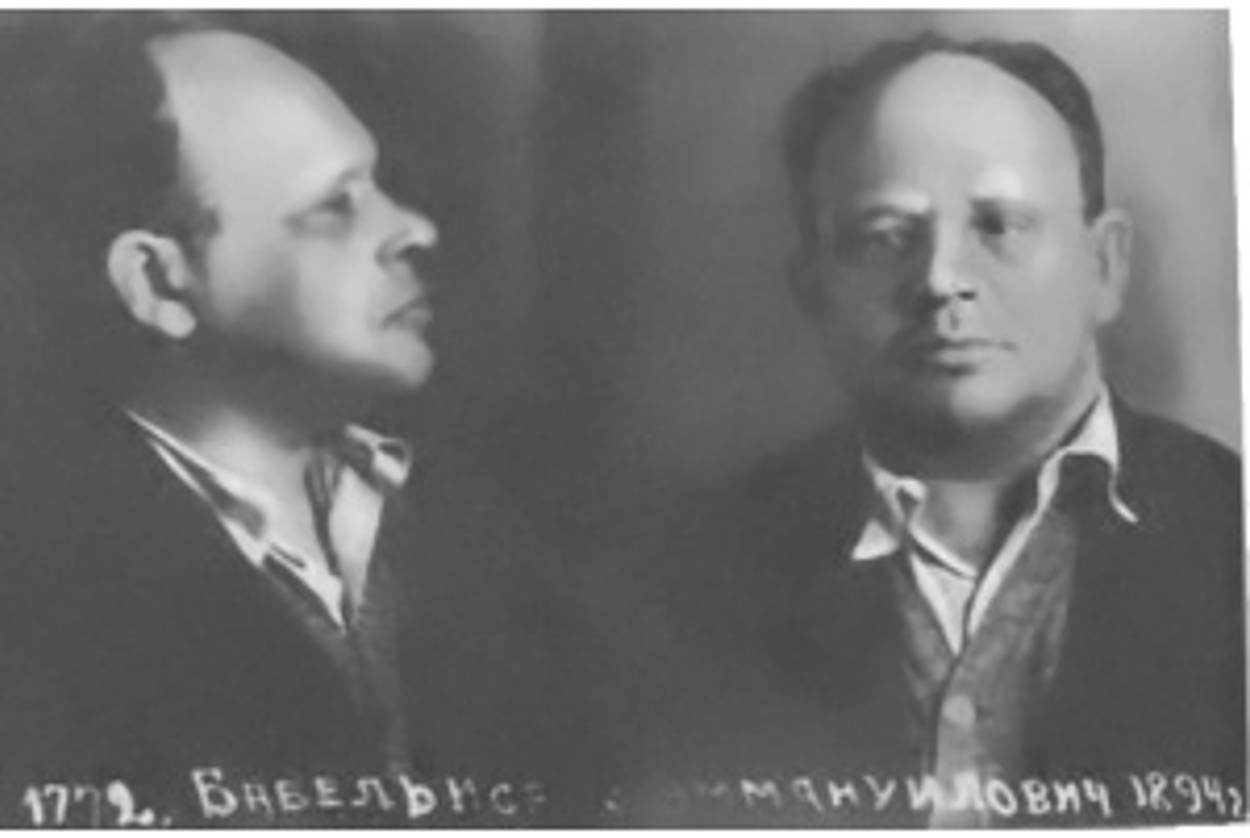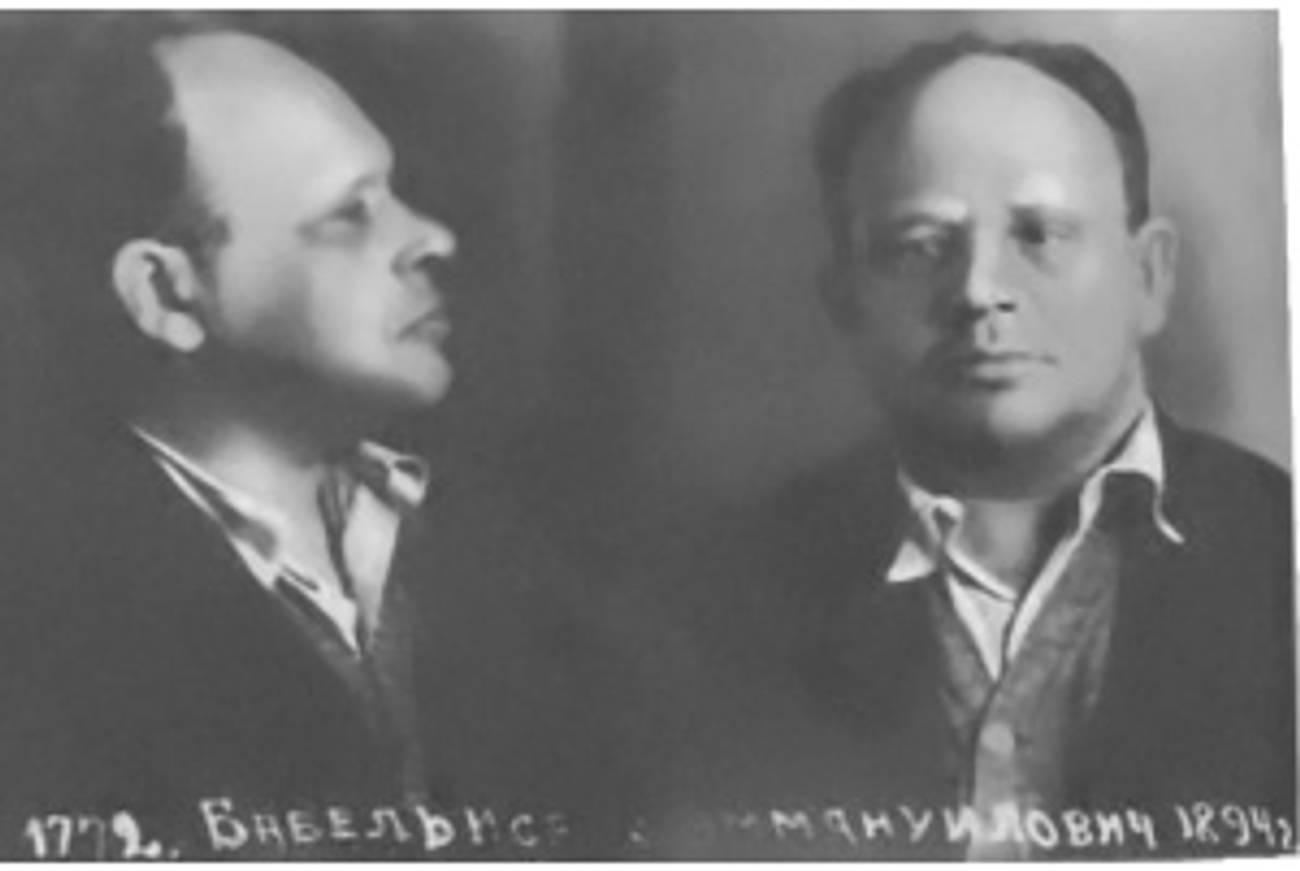A History of Violence
Lionel Trilling was a classicist who did not believe in creativity’s lower depths. So what did he see in Isaac Babel?




In 1955, Lionel Trilling published a dazzling introduction to the collected stories of Isaac Babel, a writer who’d become a ghost in his own country, his books removed from libraries, his name scratched out of encyclopedias, as if he’d never existed. Babel had written the first masterpiece of the Russian Revolution, Red Cavalry, a cycle of stories about Cossack horse soldiers fighting against the Poles in a brutal and bloody campaign; these stories had the “architecture” and complexity of a novel, a Cubist novel built on a wild geometry where the missing pieces were an essential part of the puzzle. Babel was idolized and attacked for the same reason: rather than celebrate the Revolution, he galloped across it with a cavalryman’s panache. He was the one Soviet writer who was read abroad. That made him an infidel in the Party’s eyes. And he had to walk a curious tightrope for the rest of his life—revere the Revolution and write a prickly, personal prose that was like a time bomb to the Revolution’s dull, pragmatic songs.
Babel fell into silence, wandered the Soviet Union; in the few photographs we have of him, he looks like a man wearing the mask of a grocery clerk. The rebellious writer had to be hidden at all cost. And so Babel became the jovial pal of the proletariat, who’d rather talk with jockeys and whores than with a fellow writer. Whereas he’d talked about literature day and night with his first wife, Zhenya, while he was with her in Batum, would read his stories to her until they were burnt into her heart and she could recite them twenty years later, he wouldn’t even show his manuscripts to his second wife, Antonina. He was practicing to become a man of the people who hung out at a stud farm, but he’d used up his own interior space. He was one of the voiceless men—”Ten steps away no one hears our speeches”—in Osip Mandelstam’s poem about Stalin, a poem that got Mandelstam arrested, exiled, and killed. Babel never attacked the Kremlin’s “mountaineer” with “cockroach whiskers.” Stalin was one of his readers, but that couldn’t save him.
By 1954, a year before Trilling’s introduction, Babel was “resurrected” in the Soviet Union, pronounced a person again, though the Cheka persisted in giving him a phony death date, March 17, 1941, and wouldn’t reveal how or where he had died. It was the United States that had to reinvent Babel in the person of Lionel Trilling, a godlike figure on Columbia’s campus. Trilling abhorred violence. And here he was writing about Isaac Babel, the poet of violence, who touched upon a primitive, amoral madness and seemed deeply ambivalent about it.
Babel himself had been a war correspondent attached to General Budenny’s First Cavalry, which consisted almost completely of Cossacks, and in a fictional rendering of his ride across Poland and the Ukraine with Budenny’s troops, one can almost feel Babel imagine himself as a little Cossack, with more than a bit of self-mockery as he begins to imitate their own cruel creed. Readers loved the stories, which belonged to that tiny “window” during the twenties when Russia was like a Wild, Wild West with its own avant-garde in the middle of NEP (Lenin’s New Economic Policy), as “beautiful women in mink coats” suddenly appeared in Moscow, some of them clutching copies of Isaac Babel. It troubled Trilling when he first read the stories in 1929. He’d been hoping that the Revolution might offer him an art with “as little ambiguity as a proposition in logic.” And here was Babel, full of ambiguities.
In a 1948 essay about Huckleberry Finn, Trilling describes Huck’s moral dilemma regarding Jim, the runaway slave whom he condescends to but can never seem to denounce. Huck’s own heart, like Babel’s, is a “battleground” of competing ideas and obligations. In a land of liars, he learns to lie. Yet whatever Huck’s chicanery, we never doubt his essential goodness and his reverence for the godlike Mississippi, a river that equips him with language and a sense of wonder. But there are no river gods on the ride to Poland, only Cossacks and their rituals of slaughter.
Trilling notes Babel’s “lyric joy in the midst of violence,” a rhapsody that almost numbs the reader and allows Babel to detach himself from the suffering he describes. Trilling finds in this the key to Babel’s art: “the apparent denial of immediate pathos is a condition of the ultimate pathos the writer conceives.”
And this masked pathos is but one more enigma of Isaac Babel, the man of many masks. Babel had crept under the wing of Maxim Gorky, Russia’s most revered writer, whose popularity rivaled Stalin’s. Gorky had been living in Sorrento, under Mount Vesuvius, and it was Stalin who lured him back to the Soviet Union in 1932, naming streets and parks and entire cities after this writer-saint who’d risen out of the lower depths, and “crowned” him the first president of the Soviet Writers Union. Babel couldn’t be harmed while Gorky was alive. In one apocryphal tale that Babel himself loved to tell, Gorky pops into the Kremlin with his protege, has an audience with Stalin, who asks Babel why he hasn’t written a novel about Gorky’s “Boss” (it was Gorky who began calling Stalin the country’s “senior comrade” and “Boss”). Babel doesn’t answer. He smiles. At the first Soviet Writers’ Congress in 1934, attended mostly by half-men and hacks who’d sold themselves to the Soviet dogma of socialist realism, Babel stood outside this dogma, said he was the master of a new genre, the genre of silence. He praised the Boss’s laconic style—sentences that had the sensation of steel. Yet there was something perverse about Babel’s speech, as if he were “addressing his fellow-writers in a dead language,” the dead talking to the dead in a country that sought to destroy all the idiosyncrasy of art.
Gorky died in 1936, probably poisoned by Stalin, who could no longer afford the whimsies of this old man. Stalin was bent on killing as many intellectuals as he could, and the starik might have used his prestige to get in the way. With Gorky gone, Babel no longer had a protector. How could the Soviets have reconciled themselves to Babel’s wayward art? “Intensity, irony, and ambiguousness…constitute a clear threat to the impassivity of the State. They constitute a secret.”
And so Babel was shoved into oblivion. And I couldn’t help but marvel at Trilling’s devotion to Babel, who wrote about Cossacks and the Moldavanka, the Jewish slums of Odessa, which had given birth to the King, Benya Krik, Babel’s most celebrated character, a gangster in orange pants—”the Jewish gangs of Odessa were famous,” Trilling tells us, without realizing that it was Babel who made them famous, that the Moldavanka was a poor, pathetic slum that Babel had mythologized, that there was nothing but the remotest counterpart to Benya Krik, the Crier, who could outwit Odessa police chiefs, fall in love with a merchant’s daughter during one of his night raids, and immediately return all of the merchant’s goods.
Trilling was a classicist who did not believe in creativity’s lower depths. He was too much of a measured man. I remember him on campus, with his silver hair and tweed vests and British diction that every English instructor adopted in the hope of cannibalizing Lionel Trilling. He was the lord of enlightenment and reason in the late 1950s, when literature still ruled the earth, and we poor undergraduates had a talmudic devotion to the writer’s craft. He was much more vivid than a movie star.
He was also a novelist, a teller of tales, but his fiction was curiously cloistered and flat, as if he didn’t dare to enter any wildness. “For all my life, the fear of insanity has blocked the free play of my imagination and made me too intent upon reasonableness,” declares Diana Trilling, Lionel’s wife, but she could have been writing about Lionel himself. It was in his essays that he paid homage to the river gods and found his own lilt—freed of creativity, he could afford to become creative. His essays were as musical as his name. He could have been writing a kind of dream-novel when he wrote about Huckleberry Finn and Isaac Babel.
And there were wicked stories about him. That he was the son of a Bronx tailor, that he himself was a child of the ghetto, that Lionel Trilling couldn’t have been his real name, that he was some kind of Monte Cristo who took revenge on his own impoverished past, the Jewish Gatsby who’d become a literary critic rather than a bootlegger, and reinvented himself as an Oxford don with his own kingdom on Morningside Heights.
The don died in 1975, and pretty soon his own belief in a measured imagination seemed expendable in a world that was moving closer and closer to chaos.
And then a couple of years ago I happened upon Diana Trilling’s memoir about her marriage to Lionel. And suddenly I had a different Trilling. He was indeed the son of a tailor, but a men’s custom tailor who might have dressed the king of England … or an Oxford don, a tailor who turned to manufacturing coats for the chauffeurs of millionaires and hadn’t brought up Lionel in any rough equivalent of the Moldavanka.
A bookish child who never had a bicycle or roller skates, he would become the first Jewish professor of English in the Ivy League. Even with a name that could have been invented by the master of all novelists, Henry James, Trilling had to twist himself into some kind of Anglo-Saxon golem (it was the 1930s, and the very best English departments still believed that Jews weren’t refined enough to teach Shakespeare or Keats or Matthew Arnold). He suffered from long bouts of depression, saw himself as a failed writer of fiction, and must have sensed his own unlived imaginative life, the mask he had to wear as Lionel Trilling.
And perhaps this explains his attraction to Babel, and his ability to intuit the pathos beneath Babel’s savage lines. Trilling must have felt an affinity with Benya Krik, that gangster in orange pants, as lyrical as language itself, a warrior with all the grace and willfulness of poetry. Trilling could have been dreaming about himself when he says of Babel: “[T]he unexpectedness which he takes to be the essence of art is that of a surprise attack.” He was Babel’s secret sharer, a writer who would have liked to shuck off his academic clothes and veer toward the unexpected, with its quota of surprise attacks.
Jerome Charyn is the award-winning author of more than 50 published works, including 30 novels and 8 graphic novels.